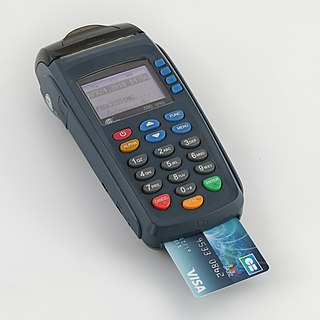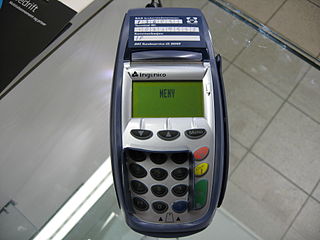Related Research Articles

Keystroke logging, often referred to as keylogging or keyboard capturing, is the action of recording (logging) the keys struck on a keyboard, typically covertly, so that a person using the keyboard is unaware that their actions are being monitored. Data can then be retrieved by the person operating the logging program. A keystroke recorder or keylogger can be either software or hardware.

The point of sale (POS) or point of purchase (POP) is the time and place at which a retail transaction is completed. At the point of sale, the merchant calculates the amount owed by the customer, indicates that amount, may prepare an invoice for the customer, and indicates the options for the customer to make payment. It is also the point at which a customer makes a payment to the merchant in exchange for goods or after provision of a service. After receiving payment, the merchant may issue a receipt for the transaction, which is usually printed but can also be dispensed with or sent electronically.

A payment terminal, also known as a point of sale (POS) terminal, credit card terminal, PIN pad, EFTPOS terminal, is a device which interfaces with payment cards to make electronic funds transfers. The terminal typically consists of a secure keypad for entering PIN, a screen, a means of capturing information from payments cards and a network connection to access the payment network for authorization.
A supply chain attack is a cyber-attack that seeks to damage an organization by targeting less secure elements in the supply chain. A supply chain attack can occur in any industry, from the financial sector, oil industry, to a government sector. A supply chain attack can happen in software or hardware. Cybercriminals typically tamper with the manufacturing or distribution of a product by installing malware or hardware-based spying components. Symantec's 2019 Internet Security Threat Report states that supply chain attacks increased by 78 percent in 2018.
Cyber spying, cyber espionage, or cyber-collection is the act or practice of obtaining secrets and information without the permission and knowledge of the holder of the information using methods on the Internet, networks or individual computers through the use of proxy servers, cracking techniques and malicious software including Trojan horses and spyware. Cyber espionage can be used to target various actors- individuals, competitors, rivals, groups, governments, and others- in order to obtain personal, economic, political or military advantages. It may wholly be perpetrated online from computer desks of professionals on bases in far away countries or may involve infiltration at home by computer trained conventional spies and moles or in other cases may be the criminal handiwork of amateur malicious hackers and software programmers.
Flame, also known as Flamer, sKyWIper, and Skywiper, is modular computer malware discovered in 2012 that attacks computers running the Microsoft Windows operating system. The program is used for targeted cyber espionage in Middle Eastern countries.
Dexter is a computer virus or point of sale malware which infects computers running Microsoft Windows and was discovered by IT security firm Seculert, in December 2012. It infects PoS systems worldwide and steals sensitive information such as Credit Card and Debit Card information.

Seculert is a cloud-based cyber security technology company based in Israel. The company's technology is designed to detect breaches and Advanced Persistent Threats (APTs), attacking networks. Seculert's business is based on malware research and the ability to uncover malware that has gone undetected by other traditional measures.
I Love Velvet is a global provider of hardware and software for mobile point of sale (mPOS) transactions and value-added retail services. I Love Velvet manufactures and sells merchant-operated, consumer-facing and self-service mPOS systems to the entertainment, retail, hospitality, and automotive industries.
PoSeidon is a name for a family of malicious computer programs targeting computerized Point-of-Sale systems.
Memory-scraping malware or RAM Scrapping malware is a malware that scans the memory of digital devices, notably point-of-sale (POS) systems, to collect sensitive personal information, such as credit card numbers and personal identification numbers (PIN) for the purpose of exploitation.
Backoff is a kind of malware that targets point of sale (POS) systems. It is used to steal credit card data from point of sale machines at retail stores. Cybercriminals use Backoff to gather data from credit cards. It is installed via remote desktop type applications where POS systems are configured. It belongs to the POS malware family as it is known to scrape the memory of POS devices.

Point-of-sale malware is usually a type of malicious software (malware) that is used by cybercriminals to target point of sale (POS) and payment terminals with the intent to obtain credit card and debit card information, a card's track 1 or track 2 data and even the CVV code, by various man-in-the-middle attacks, that is the interception of the processing at the retail checkout point of sale system. The simplest, or most evasive, approach is RAM-scraping, accessing the system's memory and exporting the copied information via a remote access trojan (RAT) as this minimizes any software or hardware tampering, potentially leaving no footprints. POS attacks may also include the use of various bits of hardware: dongles, trojan card readers, (wireless) data transmitters and receivers. Being at the gateway of transactions, POS malware enables hackers to process and steal thousands, even millions, of transaction payment data, depending upon the target, the number of devices affected, and how long the attack goes undetected. This is done before or outside of the card information being (usually) encrypted and sent to the payment processor for authorization.
BlackPOS, also known as Kaptoxa, is a point-of-sale malware program designed to be installed in a point of sale (POS) system to scrape data from debit and credit cards. BlackPOS was used in the Target Corporation data breach of 2013.
Alina is a Point of Sale Malware or POS RAM Scraper that is used by cybercriminals to scrape credit card and debit card information from the point of sale system. It first started to scrape information in late 2012. It resembles JackPOS Malware.
FastPOS is a variant of POS malware discovered by Trend Micro researchers. The new POS malware foregrounds on how speed the credit card data is stolen and sent back to the hackers.
A new sophisticated point-of-sale or memory-scraping malware called "Multigrain" was discovered on April 17, 2016 by the FireEye Inc. security company. Multigrain malware comes under the family of NewposThings Malware. This malware is similar to the NewposThings, FrameworkPOS and BernhardPOS malware which were known previously as notorious malware.
CenterPOS is a point of sale (POS) malware discovered Cyber Security Experts. It was discovered in September 2015 along with other kinds of POS malware, such as NewPOSThings, BlackPOS, and Alina. There are two versions which have been released by the developer responsible: version 1.7 and version 2.0. CenterPOS 2.0 has similar functionality to CenterPOS version 1.7. The 2.0 variant of CenterPOS malware added some more effective features, such as the addition of a configuration file for storing information in its command and control server.
Malumpos is a point of sale malware that are designed to steal or scrape customer’s credit and debit card detail from point of sale system. These are designed in a way that it records point of sale’s data which is running in an Oracle MICROS payment system of the restaurant. The collected data has been used in 333,000 customer sites around the world. Malumpos Malware targets hotels and other US businesses and put the retail customers at risk. This POS RAM Scraper is written in the Delphi programming language. Malumpos monitors, processes, scrapes the stolen data of the infected POS system and the RAM. First it stores the stolen credit or debit card details of the customer from the infected point of sale system once it is swiped. Then it sends the data to the cybercriminal to empty the customer bank balance or the details are sold to the black market.
Kasidet POS Malware is a variant of Point of Sale (POS) Malware that performs DDoS attacks using Namecoin's Dot-Bit service to scrape payment card details. It is also known as Trojan.MWZLesson or Neutrino and was found in September 2015 by cyber security experts. It is a combination of BackDoor.Neutrino.50 and the POS malware.
References
- ↑ "News Alert! PandaLabs Discovers New POS Malware". June 23, 2016.
- ↑ "New POS Malware Emerges - Punkey". Trustwave.
- ↑ "New malware program Punkey targets point-of-sale systems". PCWorld. April 16, 2015.
- ↑ Cimpanu, Catalin (23 June 2016). "Researchers Hack Their Way into Punkey PoS Malware Backend". softpedia.
- ↑ "POS Malware Delivers Credit Card Theft at Hundreds of Restaurants". Security Intelligence.
- ↑ "'PunkyPOS' Malware Dissected". Dark Reading. 24 June 2016.
- ↑ "The Best Stealth Keyloggers for Smartphones & Computers". remotekeyloggers.net. September 30, 2019.